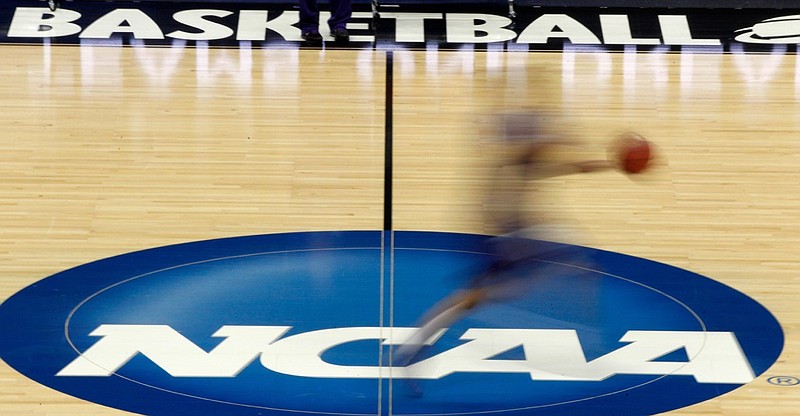Assuming nothing has changed between the time I wrote this column late Monday afternoon and whenever you read it - and assuming anything in these coronavirus times is risky business - No. 7 Kansas and No. 20 Kentucky will face off at 9:30 Tuesday night on ESPN in the State Farm Champions Classic.
Begun in 2011, the Classic has always featured the same four programs - Duke, Kansas, Kentucky and Michigan State - and always previously at a single site.
But "always" has been replaced by "who knows?" in 2020, so while KU and UK will be, pardon the pun, duking it out in Indy, Duke and MSU will have battled two hours earlier inside the Blue Devils' Cameron Indoor Stadium.
Such is life during a pandemic.
But what of college basketball in general during this first full season controlled by COVID-19? Will it reach a proper conclusion, an NCAA champion crowned from a tournament field of 68 teams, the winner then serenaded by "One Shining Moment?"
Will it crash and burn, more leagues ultimately choosing to do what the Ivy League has already done in canceling its 2020-21 season?
Or will the tournament wind up as some elitist exercise, the field shrunk by limited sites and logistics, forcing a field potentially as small as 16, which would presumably automatically eliminate such mid-to-low major conferences as the University of Tennessee at Chattanooga's Southern Conference, the Ohio Valley Conference and historically Black conferences, such as the Mid-Eastern Athletic Conference or the Southwestern Athletic Conference (SWAC)?
That wouldn't seem fair, but it's doubtful the television bigwigs would lose much sleep since the Final Four hasn't been won by a non-Power Five Conference or basketball giant Big East Conference team since UNLV won in 1990 from the Big West.
Technically, UConn did win as a member of the American Athletic Conference in 2014, but the Huskies' previous titles in 1999, 2004 and 2011 came as members of the Big East and the school has recently rejoined that league.
Point is, it would not be surprising to see the NCAA in its infinite greed and desperation alter March Madness for this year only in order to save its television revenue.
Problem is, one wonders how much longer true mid-major leagues such as Southern, OVC and Sunbelt can survive without playing in front of crowds, over even canceling games and seasons altogether. There could again, very realistically, be a 32-team NCAA tournament field for the first time in more than 40 years because there aren't enough schools playing Division I basketball to have more than that.
Early on in this pandemic, back in the spring, when too many folks believed the summer heat would kill the virus and college football stadiums would overflow with fans this fall, Notre Dame athletic director Jack Swarbrick grimly predicted the following: "We're going to lose institutions. We're going to have a number of member institutions who won't be involved in college education in 3-4 years."
He wasn't talking about athletic departments. He was referring to entire universities becoming financially crippled to the point of shutting down over revenue lost due to the pandemic.
And to look at college football alone of late is to understand his logic. Florida State alone has now canceled three straight games due to COVID-19. Tennessee's played once in three weeks and that wasn't because of a bye. UTC is supposed to play a spring Southern Conference schedule, but took the field for a single game, at Western Kentucky, during the fall.
Numerous basketball games have already been postponed, including the Tennessee Vols' first three contests, one of which was originally scheduled for this week against No. 1 Gonzaga.
It also doesn't help when Gonzaga and Auburn elect to play, as they did this past weekend, despite a Gonzaga player and staffer testing positive the previous day after a win over Kansas. Medical personnel assured there was no risk to either team, but how could they know for sure? Why even gamble on that, especially when you could be putting so many others in danger?
Does that mean the entire season is at risk? Does it mean new Iona coach Rick Pitino may be onto something when he says the NCAA should consider moving this year's tourney to "May Madness?"
Not yet. But with the virus believed to be much more contagious indoors than out, with cases soaring through the roof, you can't help but believe we're somewhere near a 50-50 split for whether this season will ultimately reach a different ending than last year, when the NCAA tourney was canceled before it began.
What does seem obvious after a week of play is that Gonzaga, Illinois and Baylor are really, really good, Kentucky is really, really young, as witness its 12-point home loss to veteran Richmond on Sunday, and that the fourth favorite to reach the Final Four is yet to be determined, though the Vols would seem to have both the talent and experience to get there for the first time in school history, assuming they ever take the court.
A few days ago, someone asked Kentucky coach John Calipari about managing COVID-19.
"We don't control it," he said. "It controls us, this virus."
The sooner we all begin to accept that, and in areas of our lives far more important than the playing of college basketball, the better off we'll be.
Contact Mark Wiedmer at mwiedmer@timesfreepress.com.
